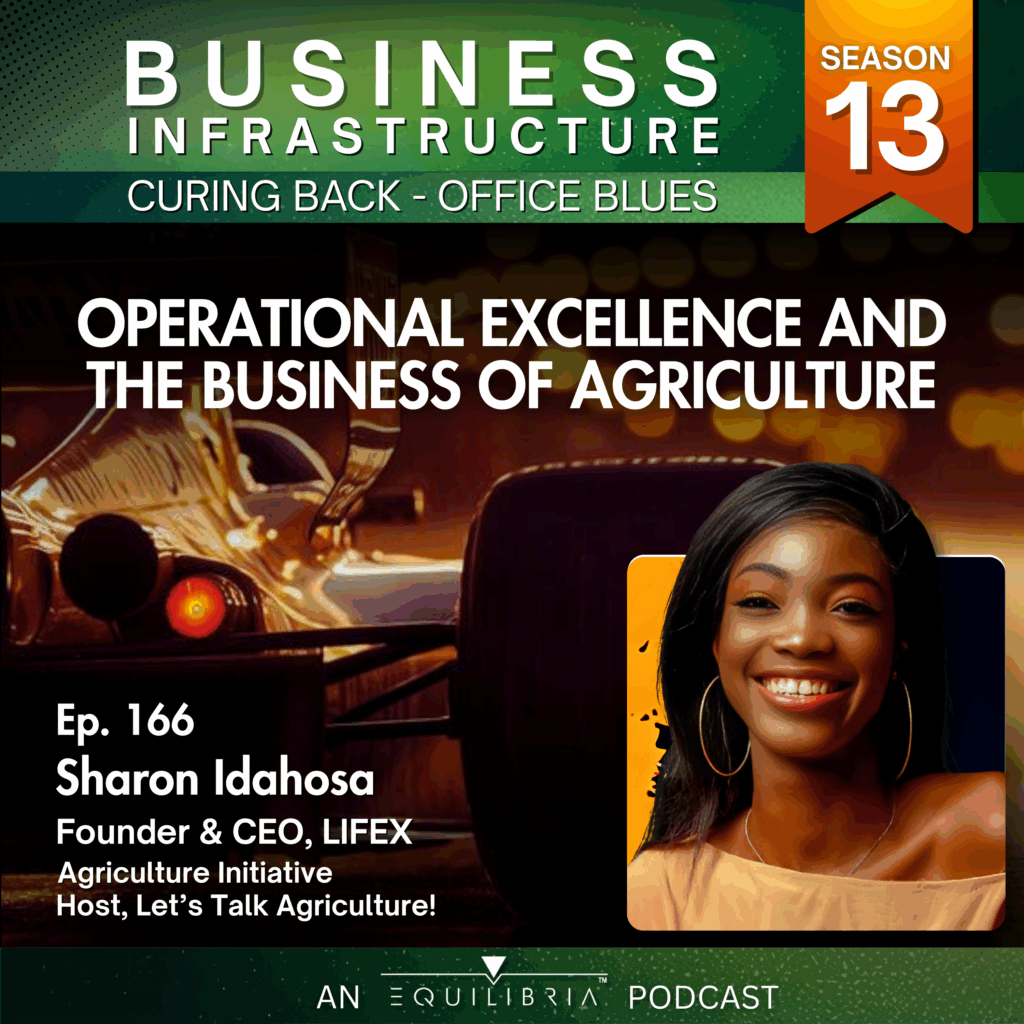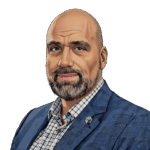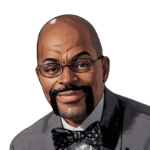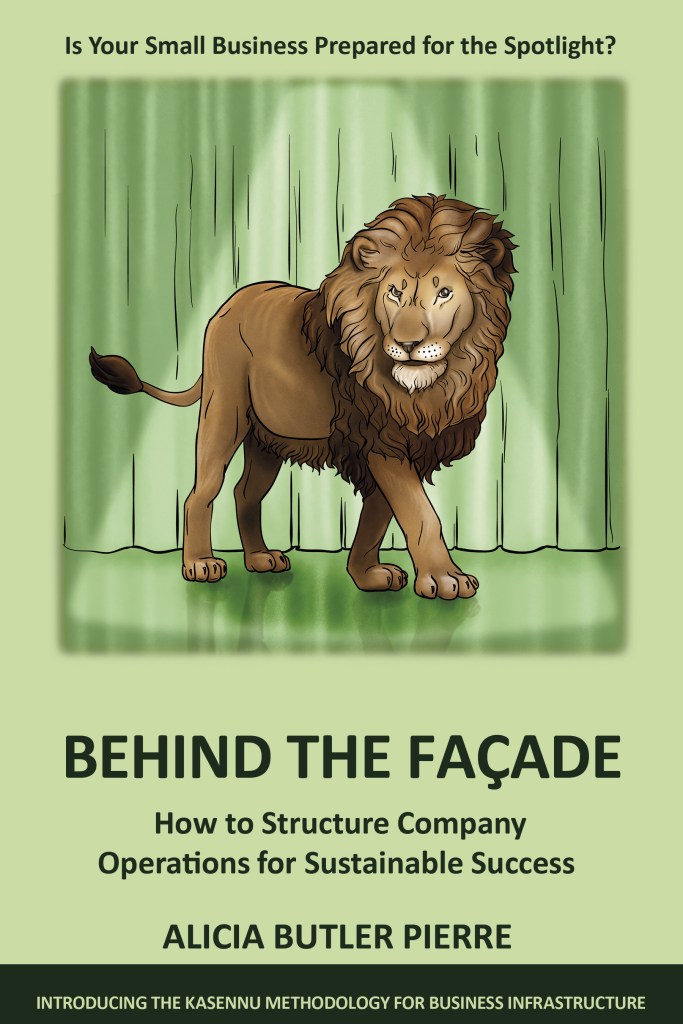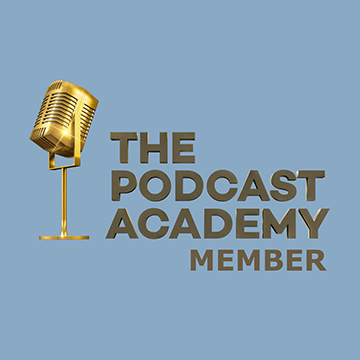Transcript
Earlier this season, I mentioned transportation infrastructure being the lifeline of any country’s economy. If goods can’t be distributed in a timely manner, then it can have an adverse effect on your ability to provide your company’s products and services.
Hi, I’m Alicia Butler Pierre. That was in the context of supply chain disruptions, starting with transportation. But now we’re going to talk about the starting point of a supply chain, raw materials, specifically agriculture. And you’re about to hear from someone who’s on a mission to make food deserts, insecurity and scarcity a thing of the past. And operational excellence is part of the foundation in making that happen.
This is season 13, episode 166. Let’s start the show welcome to Business Infrastructure, the podcast about carrying back office blues of fast growing businesses. If you’re a business owner or operator looking for practical tips and solutions to scaling your business in a sustainable manner, you’re in the right place. Now, here’s your hostess, Alicia Butler Pierre.
Have you ever wished you had a mentor that could provide advice on how to improve your customer experience and scale your business? Well, HubSpot’s got you covered. Its new podcast, the Shakeup is a show about business builders who dare to be different. Alexis Gay and Brianne Kimmel dive into the stories behind the most disruptive companies in business, examining the decisions and investments made by leaders who are building for the future by challenging the status quo.
What I love about this show is that they don’t just talk the talk, but they walk the walk too. Not only do Alexis and Brianne interview successful founders and innovators, but they have firsthand experience through their own backgrounds as business leaders and investors.
Sprinkled with a little comedy to really keep things interesting, listen, learn and grow with the HubSpot podcast [email protected] podcastnetwork having a tough time trying to explain ideas over a video conference?
Try the Think Smart Whiteboard. It’s the fastest whiteboard software in the world and allows you to upload flowcharts and write on them while your colleagues are watching remotely. Call us today for a free demo. The number is 1-866-584-6804 or visit us online at getmytablet.com now that’s smart. Think smart.
It’s season 13 and we are focusing on operational excellence, what it is and how to achieve it. And to help prove its applicability to any business, regardless of size or industry, is one of my new friends, Ms. Sharon Idahosa. Idahosa, did I say it correctly?
Sharon of Course.
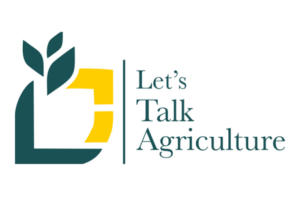
And Sharon is located in Bielsa, Nigeria, and she’s the founder and CEO of LIFX Agriculture Initiative, where she and her team leverage media to provide training and support to rural farmers. Sharon is going to share with us how she imbues operational excellence within her startup. Sharon, I’m so glad we were able to make this interview happen. Thank you so much for being here. How are you?
I’m great. Thank you very much. It’s really a pleasure coming on your show. I know, it’s really great.
Yeah. That’s why I’m so excited. I know we’ve talked before, like through WhatsApp, and we initially connected on LinkedIn and. And we’ve since been supporting each other and. Because you’re also a podcaster and. And we’re definitely going to talk more about your podcast, but it’s just so. Yeah, fascinating. Are you ready for that?
Of course.
Okay. Yes. We’re going to talk about everything. We’re going to talk about it all. Let’s see what we can get through within less than an hour, if we can. But, you know, to start off, Sharon, I’d like to read a quote that I saw on your personal website, Sharon Idahosa.
Because the work you’re doing in agriculture is so important because it helps to satisfy one of the most basic human needs, food. And so I’d like to read that quote. According to a UN report, the world is suffering from food shortage. And at the forefront of solving this food crisis is Africa. There is only one solution to solving this challenge.
The rise of rural farmers has a unique ripple effect. When rural farmers are empowered financially, technologically, food wastage, which is as high as 75% of all harvested crops, will be reduced and world hunger will be defeated because there will be enough to feed the world and the price of food will decrease. That is a tall order.
When did your passion for agriculture begin?
Okay, well, I can actually say, let me be honest, right now, because I never planned on studying agriculture from school.
Okay.
I was like, no, I can’t study agriculture. I wanted to study biochemistry. Yes. I loved chemistry, so I thought, okay, this is the right fit for me. But I never knew something else was planned for me. So when I got to school, I was given agriculture instead of. So I didn’t get a chance to change my course of study.
So I decided to follow up with it. And it was really great. I started learning and doing so much field work and all of that, but when I knew that something had to be done, like I had to get involved with the agricultural sector was during the pandemic.
So during the pandemic I realized that there were so much scarcity, food scarcity, price instability and so much more. It also affected me. Yeah. Because I remember some certain things I could get at this price. I could no longer get it at the same price during that period. So I sat down to think about how I can contribute to the agricultural sector. And that was like last year.
Of course, the pandemic was around last year and I tried to get involved. So that was how I came out with the initiative, lifex Agriculture initiative. Because I figured that the smallholder farmers are important part of the agricultural sector.
So the way we can actually boost this sector is to empower these rural farmers. And that was the reason why I came up with the initiative. Let’s see how to empower rural farmers. Let’s see how to train and equip them. And that was how it started. Actually. That was how it started. Let me not say it so much, but that was how the whole mission started.
So you have this mission. Well, first you finish school, you graduate from, from the university, Benson Idahosa University. And so what year was that? That was. Because that was maybe a year or two before you started Lifx, correct?
Yes, that was 2019. I graduated 2019, yes.
Okay. And so what did you do prior to starting LIFX agriculture initiative?
Okay, well, I had to undergo a one year youth service. That’s. That’s like a compulsory thing for Nigerians.
So I had to undergo a one year youth service in an oil and gas firm. Initially, I just figured, okay, let me just do the normal thing that every parent would expect you to do. So that’s going to the university, coming out, getting a job and then does it. So I tried, I tried that approach. No, come on, it’s the truth. Right, right, right.
No, it is. That’s why I’m laughing, because I also bucked the system. I was like, yeah, this is not for me. Working else.
Yeah. So I tried it. Okay. But it didn’t work out for me. I just realized, okay, this field is not for me. I was working in the oil and gas sector during my service and I realized I was always getting stressed out, stressed out during the wrong thing. Because that’s not.
I believe that was nowhere I was supposed to go to. So my mind was just to finish my youth service, go for my masters and then come back and get a job. But then I started seeing things in a different perspective. That was during the pandemic. I mean, the Pandemic actually helped me a whole lot, though I wouldn’t say it’s a good thing, but it helped me, should be told.
It helped me because I was able to re strategize and know what worked for me. And that was when I knew I had to go into this field. This is the field I’m supposed to be in. And that was when I started pushing it and pushing it and got to this point. It’s really been an amazing journey so far and I’m really proud of it.
So in servicing these smaller farmers, I know you leverage media quite a bit. Is that really what the initiative is about or is it just one component of the overall initiative? Because I know from looking at the website, it seems as though you also are able to connect some of these farmers with investors. Is that correct?
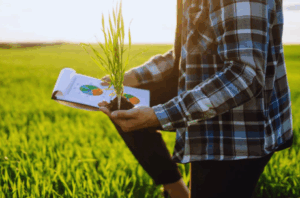
Yeah. Okay, so LIFX Agriculture is a non governmental organization. And of course every agriculture sector, I don’t think it is complete without the media sector. So I figured that this is another way to push out the NGO because I really want to equip these rural farmers. And the best way for me to do that and gain more traction is through the media sector.
So I thought, okay, let me start up a media sector. Bring farmers on the show, bring experts to talk about agriculture, and then we see how to put everything together and bring out that NGO. And that’s what we are working on. So definitely the NGO is not left out. It cannot be left out.
This is the media sector is just a way to bring out the NGO and help these farmers. Because I believe that sometimes organizations, they want to see what you’re doing so far for them to come into the picture. And that’s why I’m trying to stand as a person, as a brand, to bring out that particular sector into it. And I really hope I’m doing the right thing and doing this. Well.
you’re doing an amazing job. I always look forward to seeing what you’re posting on LinkedIn. And I think what first sparked my own personal interest and curiosity in the work that you’re doing is because it’s funny how we, there’s, there’s a lot of parallel in our stories, our professional stories, because I had a love for chemistry. Yeah. And so I pursued, like you ended up going into agriculture because it sounds like someone, someone suggested that’s what you do. And, and so similarly for me, I wanted to pursue a degree in chemistry and it was a high school teacher that suggested, gently nudged me into going into chemical engineering.
But here’s what’s interesting, my very first job out of once I finished university was at Monsanto and you know, there in the agriculture space whether, whether it be good or for evil. So, so that’s really why I was, I was so interested in the work that you’re doing because it’s so unique.
We don’t see a lot of people, especially online, in mainstream type spaces such as LinkedIn talking about something like that. And again, as we mentioned earlier in the episode, this is covering one of our most basic needs. You know, when we talk about food, clothing and shelter, we need food to sustain life.
So I think what you’re doing is just absolutely wonderful and definitely needed. So your company, you also have another company, Sedona Media. Now, is that a division of LIFX or is it a completely separate entity?
Well, I wouldn’t say it’s different entity or something. Like I said, I’m trying to see how to put everything together because like I said, an agriculture company cannot be complete without the media sector.
We are using this media sector to boost and bring out the Lifex agriculture because I really want farmers to come on the podcast. Yeah, I do want them to come share their stories and what better way to do it, if not through the media sector, to put it out there so people get to see what these farmers are into, how they can support their businesses.
That’s the aim. We really want to equip them. So this is one way to push out and tell their, their stories. Because I mean, there are so many untold stories. So yes, we are using this media company to tell these stories, to get these, these farmers what they desire, what they require.
So it’s not really a different. And everything just blends together. It connects, it always connects.
So, yeah, that’s wonderful. And you know, speaking of media, mainstream media in particular can often be slanted, as we all know and you know, me being here in America, truthfully, when we typically hear things about what’s going on in Africa throughout the continent, it’s usually images of poverty and corruption.
And that’s why I’m so grateful that you are here on the show because it’s always best to speak to people who are actually there and can tell us what’s really going on, what’s the truth. And the truth of the matter is because I’ve been doing some of my own research on Nigeria for quite a while, your country ranks number six in terms of world population with China and India being number one and number two. And you know, I had the pleasure of interviewing Amal Hassan, several, well, a couple of seasons ago, she has built the, the largest business process outsourcing company in Nigeria throughout the entire African continent, as a matter of fact. And one of the things she said to me, it just blew my mind.
She said that Nigeria graduates. There are 1 million students that graduate from university every year. That’s astounding. And so again, these are the types of facts and figures that we don’t always hear. And when I say we, I mean, you know, me being here in America.
So something else that I read up on is that oil, and it’s so funny that you mentioned that you, you had to, you spent a year working at an oil and gas company is the fact that oil is sounds like the primary source of revenue in Nigeria, but there are efforts to diversify into agriculture and telecommunications. And the beauty of what you’re doing is that it touches both areas.
So I’m curious, when we talk about operational excellence, Sharon, based on what you’ve seen from, you know, your experiences in working in oil and gas, but in particular what it means to the, the overall agriculture industry and also from your perspective regarding the outreach that you have going on within that industry, what does operational excellence mean to you in the context of agriculture?
Okay. Of course, we do believe that operations definitely is how you run your business. I mean the day to day running of your business. And for everything that I do, I strive for excellence because there are so many persons out there that can actually be doing the same thing you’re doing.
But what differentiates you from that person is how excellent you are in doing what you’re doing. Of course, so in the media sector, in the agriculture media sector, which is my own sector, I do value operations because we need to keep the business running. And sometimes we do set some time aside to plan to strategize, to see how we can get the whole business running. And I mean, I am involved in the media sector.
So we strive to come up with the right content, the right approach to reach out to our audience because that’s where our customers come from. So basically day to day activity is to ensure that our company keeps running and creating the right content. And we do this through engaging content, through our podcasts, through our adverts and social media posts and all of that.
So really we do value operations and we operate within on our own core values. And our core value is creating quality agricultural content. And somehow I think I, I had to excuse some persons from my podcast because they were not bringing to the table what I wanted to see What I wanted to see because I mean, we, we are saying, we are doing, we are striving for quality content. And I’m not giving out quality content. So I had to somehow bring them out of the show because I think it’s, it’s playing a trick on my own brand that I’m trying to build.
Yes.
And I can actually give an example. Let’s say Apple. Okay, Apple. Yes, Apple. They, there’s something about them which is security. They stand for security. That’s, to me, that’s their core value. Because every of their products, you see them trying to improve on their security.
They try to improve on their security at all time and that’s what makes them stand out. So if anybody’s trying to get an Apple a phone, let’s say, okay, you’re trying to get a phone in your. And the first instinct that comes to your mind is security. You want to get security. So you know that you have to go for an Apple phone because that’s, that’s where you get the security that is their core value.
So I try as much as possible to work around my own core value, which is providing quality content. So this also relates to the agricultural field. Of course, the Sedona Media is agriculture and what we stand for is providing quality agricultural content. So definitely we do value operation and we make it a culture.
Yes, we do make it a culture because, I mean. Yeah, sorry. Oh, I’m sorry. No, no, no, no, I apologize. Please go ahead, continue.
I mean, we do make it a culture because we’re a startup. For us actually achieve the desired result as a team and as a company, we need to stretch ourselves. Yes. And put the right attitude to the work that we do. So how do we stretch ourselves? Yeah, we do know that we’re a startup, so I can’t say we have so much capability when it comes to the. All hands on deck. Yes. We can’t do all of that right now.
So I make sure that the team is aware, of course, they know we are a startup. So we try as much as possible to improve on the areas where we have strength in. Yeah. And that’s how we get to boost and improve on, on the work that we do. So that way we’re increasing our revenue. Yes, we’re increasing our revenue. We’re not putting out, pushing out what is supposed to come to us to someone else. So.
So with lifx, is there a membership that you offer to farmers? I’m curious, how does the company generate revenue if you don’t mind sharing that.
Okay, sure. Considering it’s just a startup NGO. And sometimes, like I mentioned before, sometimes you don’t get the audience that you need to push out these organizations. And because it is something that is dear to me, I decided to come up with a different business that would help me to also fund the organization and help these farmers in terms of capacity building and all of that.
So I can’t really say that there’s some sort of funds or revenues coming from here and there, but we are working to see how to build partnerships. I’m not saying that we haven’t gotten opportunities for partnership, but like I mentioned, there are some partnerships that can come your way, but it is not in line with what you’re trying to achieve. You just have to cut it off. In as much as we know that it’s going to take us to a whole different level, but then we need to maintain and stay in line with our core values.
Yes. So intentionally seeking partnerships that align with your core values.
Yes, We don’t just accept everything because we are trying to boost our revenue or because we are trying to push out the brand out there. I mean, we have to stay in check so we know what we are doing and remain that way. So definitely we are open to partnership.
So I believe that when the time is right, we’ll know the right people and know what to do. But for now, we’re using this media to put it out there and see what we can do on our own, because that’s the dream, to be able to support smallholder farmers who contribute greatly to the agriculture sector.
And how are you getting the word out to these farmers, especially if they aren’t in densely populated areas of the country? How is that information getting to them? I know everyone you know. I know that cell phone usage or mobile phone usage is very high in Nigeria. But are you advertising to them? How exactly are they finding out about your podcast, for example?
Okay. Recently I just tried to see how to re-strategize the podcast and all of that. And we actually got ourselves an office so that we can get these people on the show. And that’s something we are putting on hold for now because I haven’t gone to my podcast, like I’m not saying three weeks now, because I’m. I’m still trying to re. Strategize. So the plan for this, to get these people on the show is to go on radio stations to talk about it.
Recently I had to speak with one of the branch managers of bank of Agriculture because I believe that he has some sort of connection with these people. And so we see how to. We are looking at how to bring them on the show. And we’re going to be leveraging on the local radio stations because I believe they listen to radios a lot. They listen to these shows like this a lot. And once we do that, we will get good data of the farmers in different regions and see how to provide them with maybe this small phones, not really Android phones, so that we can communicate with them whenever we have these things coming up.
That’s the beauty of podcasting, is that it’s, you know, if you just. If you have a smartphone, if you can get access to one of those smartphones and just download one of these, you know, whether it’s Spotify or Apple Podcast or whatever, wherever you enjoy your podcast or consume your podcast, that’s, to me, the real power in podcasting is the reach that you can have through that smartphone technology.
Yeah. But I believe that most of them, they are not. Of course, not everybody got the access to these smartphones and all of that.
Oh, they don’t. Okay.
Yeah. So that’s why. Because, I mean, they are smallholder farmers, and most of them, they cannot, should I say, afford it or because they are not privileged to have it. So we are trying to see how to make everybody get involved. So maybe when we come on the show and talk about agriculture, generally, we can see how to take that same show to the radio station to make them know about what is going on and give them the option to come on the show if they want to.
But we do plan to be going on the field to talk to these farmers and invite them personally, because that’s another way to create a form of inclusiveness. Yes, so we want to get them involved. So we have to go to. To them. Yes, we have to go to them to bring them on the show to tell their stories.

Wow. I mean, you’re doing some groundbreaking work here, Sharon. It’s really admirable. And, you know, one thing that has been repeated so far across every episode in this season is the people element of achieving operational excellence. And you’ve already spoken quite a bit about that. You know, about identifying the core values, building a company culture around that, making sure that as you continue to build your team, that everybody embraces those core values.
I know you have some other success stories that you can share with us, particularly as it speaks to excellence. Again, this mindset, this core value of. I think you also, in a previous conversation, you mentioned transparency as well. That also being a core value so we’re going to take a quick break and when we come back, I’d love for you to share with us one of those success stories.
Okay.
As companies scale systems break and data and segmentation that used to be relevant and personalized can quickly become stale and out of date. That’s where HubSpot can help. Its CRM platform helps businesses automate every process to reduce customer friction. Keep your team efficient and your customers happy by coding custom automation actions for every business process, including lead rotation, territory management, renewals and more.
You can even trigger actions in third party systems like Slack, Zoom and more directly from HubSpot workflows. And stay organized by quickly viewing, updating and managing team permissions, ensuring that everyone has access to all the assets they need at the right time.
Learn more about how you can scale your company without saying scale and [email protected] okay, we’re back. And Sharon, earlier this season we had a guest, Tim Dooner, on the show and we talked specifically about the impact that transportation infrastructure has on a nation’s economy. And that’s certainly the case for agriculture.
I remember years ago my husband had a coworker who was Ethiopian, and my husband was asking him very specifically about these commercials that we used to see here in America back in the early 80s about, you know, children and their families starving in Ethiopia. And so my husband was asking his coworker about this and his coworker said, I have no idea what you’re talking about.
So again, it just kind of goes to show how the media, you know, depending on where you are in the world, how one something that could be happening in a very small rural part of a particular country can just be magnified and you’re given the impression that the entire country is suffering from that particular plight. And that actually was not the case. But he did say something very important and it’s something I want to ask you about as well.
He said, you know, a lot of times people end up starving simply because they can’t get access to the food because of poor infrastructure. Is that also something that you’re noticing, that even with the work that you’re doing in the agriculture space, is it part of a larger effort to improve, or should it be part of a larger effort to even maybe make improvements within the transportation infrastructure of Nigeria?
Okay. I mean, I believe that access has always been a major, major thing to look at. I mean, in terms of achieving food security, there should be access in as much as there is availability. Let me just assume that there is availability of this food.
Another thing is to be able to access it. And sometimes transportation is always a barrier. Yeah, yes, that’s always been a barrier. And you see that these farmers, they must have invested their crops and all of that, but taking it to the market becomes a problem, becomes a challenge. And I mean, that’s. Infrastructure has always been an issue, but you see, there’s not. There’s not much that is done about it.
Yeah. And you know, it’s interesting when you think about how important transportation infrastructure is again, to. To any nation’s economy, because even here in America, it was just actually officially announced yesterday that they’ve reached some kind of consensus on the congressional level to try to invest in an infrastructure improvement plan. Now, whether or not that actually happens, we’ll have to wait and see
But this is an issue around the world, you know, with bridges. Bridges that are. They get old, they age. Even yesterday, sadly, there was a condominium building, I believe over 100 people now are still missing. It just collapsed. This happened in Miami, Florida. And so we have all of these people missing, unaccounted for right now.
So again, it just kind of goes back to structures. Infrastructure, as you mentioned earlier, the interconnectivity of all of it. You can’t do one and not have the other. In order for the entire ecosystem to run successfully. I’m wondering if we can now talk about the work that you’re doing.
Specifically, we talked about transportation infrastructure. But if we could go back to speaking about what you’re doing from a business infrastructure perspective. For those who are listening to this show for the first time, Business infrastructure is an operations system for linking your people, processes and tools and technologies to ensure that growth happens in a profitable and sustainable way.
Sharon, considering your core values of transparency and excellence, can you share some of the people, the processes and the tools and technologies that you leverage to make significant inroads in such a relatively short period of time.
Let’s start with the people element. I know you mentioned there’s the piece of forming partnerships with other organizations that closely align with those core values of transparency and excellence. But what about building your team internally? Who’s on your team so far and how do you actually seek those people? How do you find them?
Okay, well. Okay, so my team. My team. My team. Well, we are about five.
Okay.
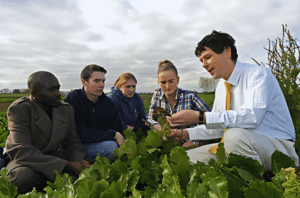
Working as a startup. Yeah. So how I got some persons, let’s say about two into my team, someone was actually making inquiries about who is into agriculture in my locality. And it was referred to me. Yeah. That there’s someone actually Doing this and that, so maybe you can link up with her.
So the person approached me and told me, I’m into agriculture, I have a farm, I need advice on how to run my agribusiness and stuff like that. So I told him about my. My organization, what I do, and he picked an interest in it and told me he wanted to work with me. He wanted to work even though I’m not paying him. He wanted to align himself with a great curse. And that was how we started. That was like last year. And we kept in touch.
We continued talking and talking. And when I wanted to build my team, I was like, okay, who should I get involved? And I just realized I didn’t have to go that far. Yeah, I didn’t have to go that far. All I had to do was, okay, I’m building this. I’m building this.
Can you. Would you want to be part of it? And it jumped on it and that was it. I mean, this is a great opportunity for me. So I really want to. I really want to be part of your team. That’s the guy talking now, not me. So it’s just. This is a great opportunity for me. I really want to be. To be part of this. This sounds amazing. Then the other person who happens to be a graphics designer. Yeah, because, I mean, media, so we have to do so much graphics and design and all of that.
So I met him when I was working in the oil and gas sector. Yes, again, because then I had to do so much of the work. I had to liaise with the designers because I walked in the store department, that’s facility and logistics, and we had contact with the suppliers and all of that. So sometimes we work with the supplier to get some of the documents that we need in the store. And then I had to meet up with this graphics guy to see how we could work together and all of that.
So after my service, I was still meeting him for jobs, and that was how we kept in touch since last year to this point. And when I wanted to launch this media company, I told him, okay, this is the plan, this is what I’m doing, and would you want to be part of this? And he was so happy that he said, I want to be part of this. This is an amazing thing you’re trying to do, and I’m willing to stay to learn and to grow. And I was like, good. My team is getting complete.
That’s awesome. So you’re. You’re able to attract people who are. They believe in the cause and the mission, which is A beautiful thing.
Yes. I mean these people are not even in the agriculture sector. I mean, they did study agriculture, but because of the person that is talking about it, because of the vision, they are joining in. And that’s really commendable and amazing because I mean, you barely see things like this. I mean, you barely see someone that wants to just join your company and then saying they’re not going to be getting paid at that instant.
I mean, their services should be required somewhere else where they’re getting a huge sum of money. But they don’t mind the fact that they won’t be getting that huge amount of money. But what matters is the fact that we grow together because as we grow together as a team, there are so many benefits. And we don’t want to talk about that right now, but I believe there’s so much to offer at the end of the day.
Sure, Okay. So you attracting these people who are committed to the vision and the mission, even though they may not be getting paid right away, they know that it’s coming. It’s coming, yes. Now I’m curious if we could talk from a process perspective.
So once you recruit them, they buy into the mission and the vision. What happens next? Are you then kind of doing maybe some basic training or giving them some background on the agriculture industry or what happens next once they start to join your team?
Well, I mean, before we go out to the public, I’ve been able to sit with them to let them know about the agricultural sector. And I think to an extent they’ve been working with me when I started the Lifex Agriculture because it had to handle my graphics design. The other person had to do some kind of publicity for me and my own personal partner. Yes, it’s good to have an amazing partner.
He also worked with me. I had to tell him, okay, you write articles as well, but you need to see how to function in the agricultural sector too. And that way we grew together. We grew together. So definitely we hope to provide this training to them of which I’m already doing. I let them know about the agricultural sector, what we are supposed to do, what we are trying to do, the mission, the goal at the end of the day, which is to connect with these farmers and how do we do that is to go out there, get your stories, spread the word.
I mean, a lot of persons need to know what is happening in the agricultural sector. So I think they are already into it. They already have the idea, but I believe that as time progresses, they have an in depth knowledge on what is expected of them, what the company is about.
I mean, I don’t think that they can grasp everything from the beginning, but with time, process, it’s a learning process. Everybody is a learning process for everybody. We can say we are experts or we are good in everything, but I believe it’s a learning process for each and every one of us. And in time, everybody would connect with it. That’s what I believe in.
Yes. And the beauty of what you’ve just described is this isn’t just a bunch of people sitting in an office on their computers reading articles. You’re actually. You and your team are actually getting out there.
It’s a true grassroots approach. You’re hitting the ground, literally, and you’re making it a point to connect face to face with many of these farmers, and that’s really the best way to really learn what’s on their hearts and minds and understanding what information they truly need access to and what really matters and is most important to them.
So I think. I think that’s wonderful. I mean, that’s. It doesn’t get any better than that, you know, hearing information directly from them as opposed to, again, going online and reading an article about it. You know, are there any other specialty technologies that you all use within your own company?
Sharon, I know you. You know, there’s. There’s obviously, you know, the. The things that you do from a telecommunications standpoint, but are there any certain technologies or additional technologies that you all are leveraging that you’d like to point out or share with our audience?
Oh, basically, for now, we are just into writing podcasts, videos. I believe we’ll grow from there. There’s so much to get done, so we’re just taking it one step at a time so we don’t get overwhelmed, but really to get it right.
Yes So now, speaking of tools and technologies, are there any resources that you’d like to share with our listeners that you found to be particularly helpful, especially as you’ve gone from concept and idea to actually starting your business, building a team, starting the podcast, starting the blogs, and all of the other things that you were doing to actively communicate to your core audiences?
Okay. While starting out, I did leverage on reading books, listening to podcasts, and also human resource. Let me use the word mentor.
Yes.
Yes. I can actually recommend books because, I mean, I don’t just read agricultural books alone. I try as much as possible to diversify in terms of reading books on business, finance, and all of that, because I am not just in the agriculture sector now alone.
I am trying to form a business and for me to operate as a business person, I need to understand the fundamentals of business as well. I need to have a foundational knowledge of business. The same thing goes to a person that is trying to start an agribusiness venture. You don’t just start an agribusiness venture without having a foundational knowledge of what agribusiness is. Because you see so many entrepreneurs, they just come and tell you, I started fish farming and then it just crashed at the end of the day. And sometimes I tell them that’s because you just jumped into it. You just wanted to to get money quick.
Agriculture is not to get money quick scheme, it’s a business. So you have to learn about that particular business you want to venture into. You don’t just rush into it. It’s not a Ponzi scheme, it’s a real business, it’s a full time business. So you need to, you need to learn about it. I believe now there are so many online learning platforms where you can pick up a particular course and learn about that particular thing you want to go into.
So I leverage on books and there is this book I can actually recommend by a Nigerian author that’s the Smart Money Woman. It’s by Nigerian author. Yes, by Arace. I really love that book. That helped me when I was trying to start out, I started reading the book. She did justice to the book. And I still follow podcast. She’s also podcasting too. Okay. It’s Yes, it’s really nice. It’s really nice. And I am also leveraging on a mentor.
Yes. When I started lifex Agriculture, I started giving so much of my time to social media. I was actively involved in social media and putting out content, letting people know what I am doing. And that attracted a mentor. Yes, Yes. I met a mentor on LinkedIn, believed in what I was doing. Yes. And up to now we still talk. I can call him. Oh yes. I told him about this Sedona Media right now. I said, oh, so I’m launching this and that.
He was really proud of me. He was really happy about how far I have gone since we connected. I mean, I really encourage people to sit out with mentors because they would really guide you through the process. They help with your growth, they help with your entrepreneurial journey as well. So I mean, they’ve gone far.
So you have to by any means align yourself with people that have gone far in that particular field, even if not in that field. Because my mentor is someone in banking and finance. And. But he has the knowledge about agriculture. Yeah. Mr. Imnishwaib. Yes. That is. I mean, it’s wonderful.
Yeah, that is wonderful. And, you know, you just, you never know who’s watching you online.
Exactly.
And the fact that you’ve been able to attract that mentor, especially in banking and finance, because we all need money to our priority, our businesses, that’s even better. So congratulations on that. I do want to make sure we plug the podcast.
It’s called let’s Talk Agriculture. And as you’ve mentioned, you interview different farmers. Are there other people just in general within the agriculture space that you also interview as well?
Sharon we’re trying to keep it focused on just agriculture. I think that’s what we’re trying to do before now. But for the sake of strategizing, I’m thinking of how to bring different stakeholders because we have business people on the show as well.
So we want to see how to diversify in terms of the podcast, because agriculture and business, they go together. So let’s see how to connect them together and help these entrepreneurs out there and farmers as well.
And speaking of connecting people, what’s the best way that people can connect with you?
Yes, I’m very, very active on LinkedIn. Like, that’s my number one social media platform. You can, you can chat me up, like, anytime, anything. I’ll respond to you. And you can also send me a message on my own personal email. That’s info sharindelsa.com. yeah.
Okay.
You can always reach out to me on that.
Well, I’m so grateful. Again, this has been very educational for me because, again, the work that you’re doing is so, so important. Again, I can’t stress this enough. It deals with solving a most basic need for humankind, and it’s starting off very grassroots.
But I know that if you just continue doing what you’re doing, Sharon. Oh, my gosh. I mean, you’ve attracted this mentor, but I can’t imagine the additional resources that you are about to attract. In fact, I look forward to helping you celebrate the day that you get that big partnership with the UN or maybe another major world health type organization. I definitely see that in your future. So we’re going to officially speak that into existence.
Yes.
Now, just to recap some of the things that you’ve shared with us. I mean, wow, you’ve done so much in such a relatively short period of time. It really is amazing. Sharon. So you are officially one of my sheroes now. But thank you for sharing your story with us and how it all started with you wanting to pursue originally a career in biochemistry and as fate would have it, you landed in agriculture instead. And the fact that you were introduced to oil and gas for what sounds like it’s comparable to what we would call an internship for about a year.
Yes, you did that for about a year and realized, you know what, I don’t have passion for this. And so your passion has been able to shine through your organization, Lifex Agriculture initiative. I love the fact that you talked about how you define operations and the reason it may sound so trivial, but let me tell you, there are so many people, even people who may be listening right now, who still can’t really wrap their heads around, well, what do you mean when you say operations? But your, your definition is so clear and succinct.
You said that operations is the day to day running of your business. And the fact that you strive to for excellence in everything that you do and because of that striving for excellence, that’s at the end of the day, that is your company’s competitive advantage. And you also kind of shared some of your keys to success that you’ve experienced so far.
With that being taking time to plan and strategize and then also making sure that you have measures in place to ensure that you are consistent consistently creating content that is not only engaging, but is of the highest quality as well. I also thought it was interesting when you talked about Apple’s core value being security and how once you are able to identify a core value for your business, you can then build your operations around that.
And the fact that it must be imbued into the culture and the fact that you and your team are consistently stretching yourselves to improve on your strengths. Just having that spirit of quality, operational excellence and continuous improvement. I know for sure you are going to be doing some really, really big things, Sharon. And I can say, I remember, just don’t forget about us little people here when you make it to the top.
Oh please. Oh my God.
I thought it was also interesting that we were able to have a very candid conversation about what it takes to truly achieve food security and how transportation, a lot of people may not realize it, but transportation alone can be a huge barrier to achieving food security. And if we can just work on that, not just our business infrastructure, but the transportation infrastructure as well. And then lastly, I love the part about on that, on the ground training, just getting out there, connecting with people. Don’t have them come to you, you go to them. And that is the crux of your company’s outreach program.
If you want more details about Sharon and the inroads that she’s making in agriculture, make sure you connect with her again. You can find her on LinkedIn. Her name is Sharon, last name is Idahosa and that is spelled I D A H O S A. She was also kind enough to share her email address with us. Info Sharonidajosa.com Sharon, thank you so much for taking time today to come onto the show.
Thank you so much for having me. It’s really a pleasure.
Oh, the pleasure is all mine. Don’t forget to check out BusinessInfrastructure TV so you can access links to some of the resources that Sharon shared with us today.
We’ll also make sure we link to that book that she referred us to. There’s no need to type out the web address. Don’t worry about that. All you have to do is click on the link in the description of this episode, wherever you’re listening to this podcast, and it’ll take you directly to that list of resources that Sharon writes recommends.
We’re also going to have links to Sharon’s different websites as well. You’ll also find information about the HubSpot Podcast Network as well as our sponsors. Please make sure you support them because when you do, it helps us keep this show free for you. Again, click the link in the episode’s description.
Thank you so much for tuning in and for being a loyal subscriber. Remember, stay focused, be encouraged, keep operating as good on the inside as you look on the outside, because this entrepreneurial journey is a marathon and not a sprint. Until the next time, thank you for listening to Business Infrastructure, the podcast about curing Back Office blues with Alicia Butler Pierre.
If you like what you’ve heard, do us a favor and subscribe. Leave a rating and review, and more importantly, share with your colleagues and team members who could benefit from the information. Join us next week for another episode of Business Infrastructure with Alicia Butler Pierre.
![]()
![]()


